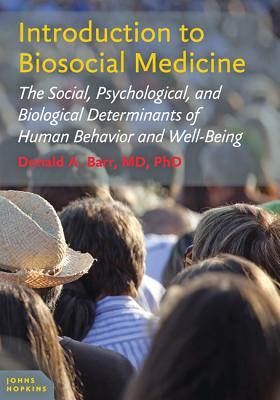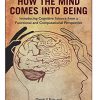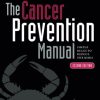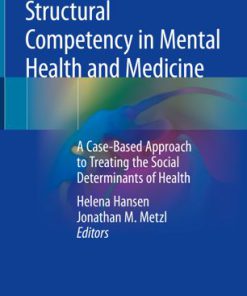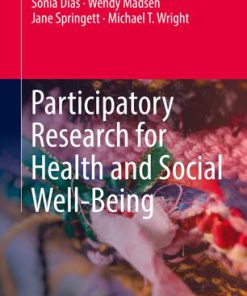Introduction to Biosocial Medicine 1st edition by Donald Barr 1421418606 9781421418605
$50.00 Original price was: $50.00.$25.00Current price is: $25.00.
Introduction to Biosocial Medicine 1st edition by Donald Barr- Ebook PDF Instant Download/Delivery:1421418606,9781421418605
Full download Introduction to Biosocial Medicine 1st edition after payment
Product details:
ISBN 10:1421418606
ISBN 13:9781421418605
Author:Donald Barr
Understanding human behavior is essential if medical students and doctors are to provide more effective health care.
While 40 percent of premature deaths in the United States can be attributed to such dangerous behaviors as smoking, overeating, inactivity, and drug or alcohol use, medical education has generally failed to address how these behaviors are influenced by social forces. This new textbook from Dr. Donald A. Barr was designed in response to the growing recognition that physicians need to understand the biosocial sciences behind human behavior in order to be effective practitioners. Introduction to Biosocial Medicine explains the determinants of human behavior and the overwhelming impact of behavior on health.
Drawing on both recent and historical research, the book combines the study of the biology of humans with the social and psychological aspects of human behavior. Dr. Barr, a sociologist as well as physician, illustrates how the biology of neurons, the intricacies of the human mind, and the power of broad social forces all influence individual perceptions and responses. Addressing the enormous potential of interventions from medical and public health professionals to alter these patterns of human behavior over time, Introduction to Biosocial Medicine brings necessary depth and perspective to medical training and education.
Introduction to Biosocial Medicine 1st Table of contents:
Chapter 1 • Understanding Human Behavior
The need to understand human behavior
What is behavior?
Well-being and the consequences of behavior
The impact of social inequality and social hierarchy on behavior
How cultural context affects behavior
Social group identity, status inequality, and behavior
Motivation as a key mediator of behavior
Personality: Who we are
Neural structure as a basis of behavior
Cognition: How we think and what we know
How social inequality and stressful childhood experiences impact cognition, behavior, and well-being
Connecting the causes of early adversity to well-being over the life course: Understanding the causal links and the interventions that hold the most promise
Chapter 2 • Behavior and Well-Being
Physical well-being
Physical well-being beyond life expectancy
Social well-being
Summary
Chapter 3 • Inequality and Well-Being
Racial and ethnic inequality in health in association with educational inequality
How does inequality in access to medical care affect health inequality?
The differing impact of low education and low income on the health of minority groups
The origins and meanings of the concepts of race and ethnicity in the United States
The changing demographics of the population in the United States
The disparate impact of inequality on Hispanics and blacks
Summary
Chapter 4 • Society, Culture, and Behavior
The impact of culture: The Cultural Cycle
Differing perspectives on the nature of social structure
The role of culture in influencing personality and behavior
Other contexts in which independence and interdependence Clash!
Acculturation: When people move across cultural boundaries
The role of social networks in affecting behavior
Summary
Chapter 5 • Identity and Behavior
Social identity: Responding to the social group
Alternative forms of capital and their impacts on social status
Questioning one’s identity in the context of cultural mismatch: The case of FirstGen students entering college
The competition for status: Group identity, bias, and stereotype threat
Attribution theory: Explaining why other people act the way they do
Letting the behavior of others guide our own: The bystander effect
Social impact theory and social loafing
Summary
Chapter 6 • Motivation and Behavior
The marshmallow experiment: How long will kids wait for a treat?
The role of motivation in affecting behavior
The cognitive understanding of the self as a driver of motivation
Time perspective and the Up Series children
Zimbardo and time perspective
Noncognitive aspects of motivation and Maslow’s hierarchy of needs
Summary
Chapter 7 • Personality, Behavior, and Well-Being
Sigmund Freud and the stages of psychosexual development
Erik Erikson and the stages of psychosocial development
Criticisms of the Freud/Piaget/Erikson perspectives on the stages of development
Understanding adult personality traits using the “Big Five”
Scales of personality that go beyond the “Big Five”
Mental illness and disorders of personality
Summary
Chapter 8 • The Brain and Behavior
The importance of communication between information sources: On the Internet and in the human brain
The development of the human brain, from embryo to organ
The molecular biology of nerve conduction and neuronal myelination
Transmission of a nerve impulse across the synapse
Brain systems for emotion and response to stress
Summary
Chapter 9 • Cognition, Behavior, and Well-Being
The development of cognition
The development of language and reading ability as examples of Piaget’s stages of development
Learning math in Piaget’s next stage
Memory and its role in cognition
Emotional stress as another source of long-term memory
Summary
Chapter 10 • Social Inequality, Childhood Experiences, and Behavior
Socioeconomic inequality and early school readiness
The impact of social disadvantage on adolescent development
The added impact of minority race
Adolescent educational attainment as reflecting parents’ educational attainment
Summary
Chapter 11 • Understanding Well-Being and the Interventions That Can Enhance It
Social inequalities in adult health
The early roots of adult health behaviors
Identifying and adopting interventions to improve adult health through the reduction of adverse childhood experiences
The effects of early childhood intervention for children at risk of ACEs
Home visitors and the Maternal, Infant, and Early Childhood Home Visiting Program
Looking to the future
People also search for Introduction to Biosocial Medicine 1st :
introduction to sociology basirico
an introduction to biology
an introduction to the profession of social work
an introduction to bioinformatics algorithms
biosocial interaction
Tags:
Donald Barr,Biosocial,Medicine,Introduction
You may also like…
Business & Economics
Well being Sustainability and Social Development Harry Lintsen
Uncategorized
Business & Economics - Management & Leadership
Corporate Behavior and Sustainability Doing Well by Being Good 1st Edition Güler Aras
Education Studies & Teaching - School Education & Teaching
Politics & Philosophy - Social Sciences
Participatory Research for Health and Social Well Being Tineke Abma
Religion & Spirituality


